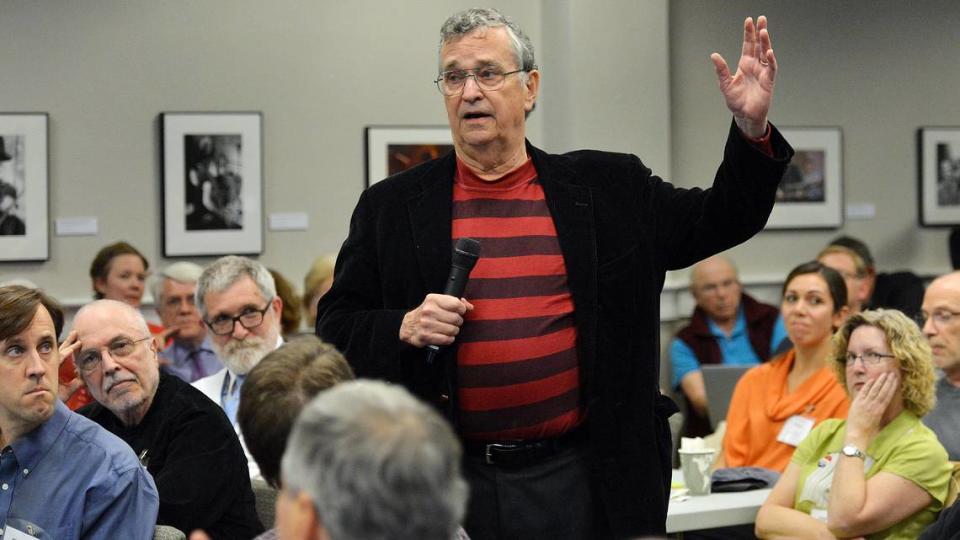UNC professor Hodding Carter III, key aide during Iran hostage crisis, dies at 88
- Oops!Something went wrong.Please try again later.
- Oops!Something went wrong.Please try again later.
- Oops!Something went wrong.Please try again later.
Hodding Carter III, an award-winning journalist and public official who served as the spokesperson for the U.S. State Department during the Carter administration, died Thursday in Chapel Hill after a years-long decline in health, his family confirmed to The News & Observer on Friday. He was 88.
Carter, who was born in New Orleans and grew up in Greenville, Mississippi, was professor of leadership and public policy at UNC-Chapel Hill, a position he held for more than a decade beginning in 2006.
His time at UNC followed an expansive career in journalism, politics and public affairs that included an 18-year reporting, editing and publishing career at the Delta Democrat-Times, the Greenville paper founded by his eventual Pulitzer Prize-winning father, as well as commentary roles for national television networks.
A 1957 graduate of Princeton University and a veteran of the U.S. Marine Corps, Carter held deeply the notion of service — to his country, to justice and equity and to his family — throughout his life, instilling in those he knew personally and professionally “this incredible sense of social responsibility,” Mike Derian, Carter’s stepson, told The News & Observer by phone Friday.
Throughout the 1950s and ‘60s, Carter “shepherded” journalists around Mississippi as they came to cover the Civil Rights Movement in the state, Derian said.

He was involved politically with the presidential campaigns of Lyndon B. Johnston in 1964 and Jimmy Carter in 1976, going on to serve as assistant secretary of state for public affairs under the latter. That position essentially made him the Carter administration’s public face on the Iran hostage crisis of the late 1970s and early ‘80s.
“He was on TV every night being a calming voice of reason,” Derian said of his stepfather’s work during that time.
Carter married Patt Derian, who was the assistant secretary of state for human rights in the Carter administration, in 1978. Together, the couple raised and embraced their blended family of seven children, often hosting memorable, annual holiday gatherings in Mississippi, Washington, D.C., and later, their home in Chapel Hill.
“I was always struck by the range and number of old friends who would come, many of whom had been young journalists who apprenticed with him and his family at their newspaper in Greenville,” Bill Ferris, a UNC history professor and close friend of Carter’s, said Friday.
After his years working in public affairs and journalism, Carter turned to teaching public policy courses at a handful of universities, including the University of Maryland, where in 1995 he became the Knight professor of public affairs journalism.
Always a mentor to those around him, starting with the reporters of the 1960s and throughout his career, teaching allowed him to further that passion, Catherine Carter Sullivan, Carter’s daughter, said Friday — something he loved perhaps more than any one job he held.
“I’ll tell you that one of his favorite jobs was as a professor, and that goes back to the mentoring,” Sullivan said. “He loved everything, but what he talked about most richly, in rich terms, was how excited it made him to hear young graduate students working through policy issues.”
He later became the president and CEO of the Knight Foundation, where he developed a friendship with Bill Friday, the late head of the UNC System, who chaired the foundation’s commission on intercollegiate athletics, Ferris said.
Then-UNC Chancellor James Moeser, Friday and Ferris recruited Carter to UNC in 2005 after he announced he would step down from the Knight Foundation, Ferris said.
Ferrel Guillory, a respected Southern journalist and now-retired professor at the UNC Hussman School of Journalism and Media, at the time called Carter “a major figure in journalism, national government and politics and foundations,” according to a News & Observer report from 2005.
“His life was always connected to journalism and public truth,” Ferris said Friday.
Carter was an outspoken member of the UNC faculty on issues including the athletic scandal related to the Wainstein report published in 2014, as well as the ousting of UNC System president Tom Ross in 2015, according to News & Observer reports. He also served on several advisory boards at the university, including for UNC Press and Carolina Performing Arts.

Approximately 18,000 of Carter’s personal and professional papers from the 1950s to the 2000s are housed at the Southern Historical Collection at UNC.
The family plans to hold a celebration of Carter’s life at Chapel of the Cross in Chapel Hill, Sullivan said Friday, at a date to be determined. He will be buried in Greenville, Mississippi.

